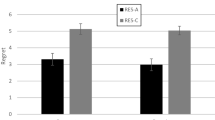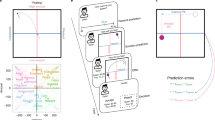Abstract
When forecasting their own behavior, people are often inaccurate and tend to predict that they will engage in more socially desirable behavior than they actually do. The problem with inaccurate behavioral forecasts is that they can lead to negative consequences both for the self and for others. One particularly negative consequence may be that such errors can produce overly harsh evaluations and condemnation of others who do not act in a way that most people predict they themselves would act. This paper identifies these common behavioral forecasting errors, why they occur, and the negative interpersonal and unintended, unethical consequences they can have.
Similar content being viewed by others
References
Alicke M. D. (1993). Egocentric standards of conduct evaluation. Basic and Applied Social Psychology 14:171–192
Baker D. D., Terpstra D. E., Larntz K. (1990). The influence of individual characteristics and severity of harassing behavior on reactions to sexual harassment. Sex Roles 22:305–325
Banaji, M. R., M. H. Bazerman and D. Chugh: 2003, ‹How Unethical are You?’, Harvard Business Review, December
Bazerman M. H., Banaji M. R. (2004) The social psychology of ordinary ethical failure. Social Justice Research 17:111–115
Caruso E. M., Epley N., Bazerman M. H. (2006) The costs and benefits of undoing egocentric responsibility assessments in groups. Journal of Personality and Social Psychology 91:857–871
Chugh, D., M. H. Bazerman and M. R. Banaji: 2005, ‹Bounded Ethicality as a Psychological Barrier to Recognizing Conflict of Interest’. In D. A. Moore, D. M. Cain, G. Loewenstein, M. H. Bazerman (eds.), Conflicts of Interest: Challenges and Salutations in Business, Law, Medicine, and Public Policy
Diekmann K. A., Galinsky A. D. (2006) Overconfident, underprepared: Why you may not be ready to negotiate. Harvard Negotiation Newsletter 9:6–9
Diekmann, K. A., A. D. Galinsky, S. D. Sillito and A. E. Tenbrunsel: 2007a, ‹From Behavioral Forecasting Errors to Interpersonal Condemnation’. Working Paper
Diekmann, K. A., A. D. Galinsky, A. E. Tenbrunsel and S. D. Sillito: 2007b, ‹The Causes of Behavioral Forecasting Errors: Examples From Two Conflict Situations’. Working Paper
Diekmann K. A., Tenbrunsel A. E., Galinsky A. D. (2003) From self-prediction to self-defeat: Behavioral forecasting, self-fulfilling prophecies, and the effect of competitive expectations. Journal of Personality and Social Psychology 85:672–683
Dunning D., Meyerowitz J. A., Holzberg A. D. (1989) Ambiguity and self evaluation: The role of idiosyncratic trait definitions in self serving assessments of ability. Journal of Personality and Social Psychology 57:1082–1090
Epley N., Dunning D. (2000) Feeling “holier than thou”: Are self-serving assessments produced by errors in self- or social prediction? Journal of Personality and Social Psychology 79:861–875
Epley N., Dunning D. (2006) The mixed blessings of self-knowledge in behavioral predictions: Enhanced discrimination but exacerbated bias. Personality and Social Psychology Bulletin 32:641–655
Epley, N. and E. M. Caruso: (2004) Egocentric Ethics, Social Justice Research 17, 171–187.
Fiske S. T. (2004) Intent and ordinary bias: Unintended thought and social motivation create casual prejudice. Social Justice Research 17:117–127
Why Didn’t She Just Report Him? The Psychological and Legal Implications of Women’s Responses to Sexual Harassment. Journal of Social Issues 51, 117–138.
Fitzgerald L. F., Swan S., Fischer K. (1995) Why didn’t she just report him? The psychological and legal implications of women’s responses to sexual harassment. Journal of Social Issues, 51:117–138
Greenwald A. G., McGhee D., Schartz, J. L. K. (1998) Measuring individual differences in implicit cognition: The Implicit Association Test. Journal of Personality and Social Psychology 74:1464–1480
Gruber J. E., Bjorn L. (1982) Blue-collar blues: The sexual harassment of women autoworkers. Work and Occupations 9:271–298
Gutek B. A. (1985) Sex and the workplace: Impact of sexual behavior and harassment on women, men, and organizations. San Francisco: Jossey-Bass
Liberman N., Trope Y. (1998) The role of feasibility and desirability considerations in near and distant future decisions: A test of temporal construal theory. Journal of Personality and Social Psychology 75:5–18
Newby-Clark I. R., Ross M., Buehler R., Koehler D. J., Griffin D. (2000) People focus on optimistic scenarios and disregard pessimistic scenarios while predicting task completion times. Journal of Experimental Psychology: Applied 6:171–182
Osberg T. M., Shrauger, J. S. (1986) Self-prediction: Exploring the parameters of accuracy. Journal of Personality and Social Psychology 51:1044–1057
Palmer, B.: 2002, `Ten Years Later, Anita Hill Revisits the Clarence Thomas Controversy', Stanford Report, April 2:2002. Stanford University
Rudman L. A. (2004) Social justice in our minds, homes, and society: The nature, causes, and consequences of implicit bias. Social Justice Research 17:129–142
Rudman L. A., Glick P. (2001) Prescriptive gender stereotypes and backlash toward agentic women. Journal of Social Issues 57:743–762
Sherman S. J. (1980) On the self-erasing nature of errors of prediction. Journal of Personality and Social Psychology 39:211–221
Vallone R. P., Griffin D. W., Lin S., Ross, L. (1990) Overconfident prediction of future actions and outcomes by self and others. Journal of Personality and Social Psychology 58:582–592
Woodzicka J. A., LaFrance M. (2001) Real versus imagined gender harassment. Journal of Social Issues 57:15–30
Author information
Authors and Affiliations
Corresponding author
Rights and permissions
About this article
Cite this article
Diekmann, K.A. “She did what? There is no way I would do that!” The Potential Interpersonal Harm Caused by Mispredicting One’s Behavior. J Bus Ethics 80, 5–11 (2008). https://doi.org/10.1007/s10551-007-9437-x
Published:
Issue Date:
DOI: https://doi.org/10.1007/s10551-007-9437-x




